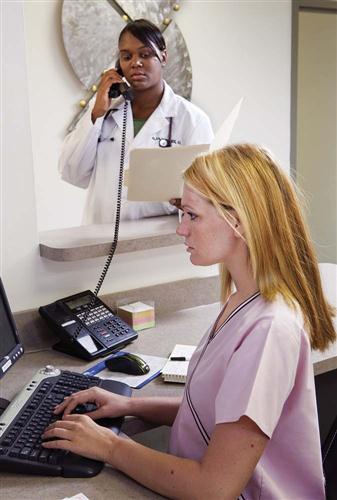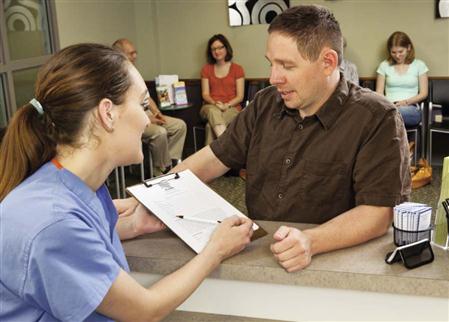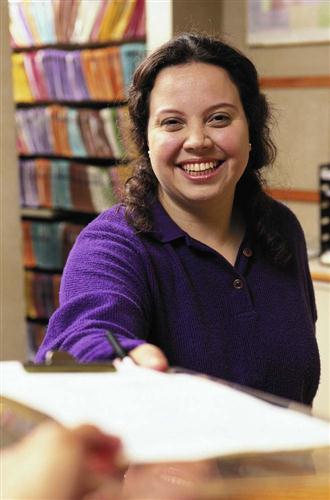Professional Behavior in the Workplace
Learning Objectives
1. Define, spell, and pronounce the terms listed in the vocabulary.
2. Explain the reasons professionalism is important in the medical field.
3. Discuss several of the characteristics of professionalism.
4. Explain why confidentiality is so important in the medical profession.
5. Discuss the importance of the medical assistant’s attitude in caring for patients.
6. List some examples of office politics.
7. Identify specific ways teamwork can be promoted in the physician’s office.
8. Discuss the meaning of insubordination and why it is grounds for dismissal.
9. Identify and implement time management principles to maintain efficient office function.
10. Talk about goal setting and how it helps a person achieve career success.
11. Discuss how substance abuse can impact the medical assistant’s employment.
Vocabulary
characteristics Distinguishing traits, qualities, or properties.
commensurate (ku-men′-su-rut) Corresponding in size, amount, extent, or degree; equal in measure, proportionate.
competent Having adequate or requisite capabilities.
connotation (kah-nuh-ta′-shun) An implication; something suggested by a word or thing.
credibility The quality or power of inspiring belief.
demeanor (di-me′-nur) Behavior toward others; outward manner.
detrimental (de-truh-men′-til) Obviously harmful or damaging.
disseminated (di-se′-muh-na-ted) To disburse; to spread around.
drug of choice The drug an abuser uses most frequently to satisfy the craving for a certain feeling; the user’s preferred drug.
initiative Energy or aptitude to cause or facilitate the start of something or to cause something to happen.
insubordination (in-suh′-bor-din-a-shun) Disobedience to authority.
reproach An expression of rebuke or disapproval; a cause or occasion of blame, discredit, or disgrace.
work ethics A set of values based on the moral virtues of hard work and diligence.
Scenario
Karen Yon has wanted to work in the medical field for most of her adult life. She studied very hard in high school and graduated with honors. She volunteered in a local hospital and then, after working as a server in restaurants for 3 years, she enrolled in medical assisting classes. After her externship, she was asked to continue as a regular employee at a family practice in her area.
Karen strives to perform all her duties professionally and compassionately. She maintains a professional image for patients and co-workers. She had found it difficult to learn to be professional at all times and show compassion to patients through just the classroom experience. However, she knew that these were important aspects of her job, and she was able to gain valuable experience in these areas during her externship. Because this is her first job in the medical field, she wants to make a good impression on her employer and to be a team player.
Throughout most of Karen’s training as a medical assistant, her grandmother was confined to a rehabilitation center after a stroke. Although she has progressed well with treatment, Karen is the only relative who lives close to the rehabilitation center, and her family depends on her to check on her grandmother from time to time. Karen enjoys spending time at the center reading to her grandmother, because they are close. Still, Karen realizes that the stroke has caused permanent damage, and her grandmother’s health seems to be declining.
While studying this chapter, think about the following questions:
What is professional behavior? We tend to hold medical personnel to a higher standard of professionalism than those in most other career fields. The medical assistant who works to improve his or her professional approach in the workplace is an asset to the employer and will quickly be promoted to positions of more responsibility in the healthcare industry. Some employers are more concerned about medical assistants’ professional behavior and interpersonal skills than their clinical skills, because the way that the medical assistant approaches and interacts with patients is critical to the success of the practice. Professionalism is useful not only in the physician’s office; it also is a valuable skill when dealing with other business professionals in everyday life, such as a teacher or business owner.
The Meaning of Professionalism
Professionalism is defined as having a courteous, conscientious, and generally businesslike manner in the workplace. It is characterized by or conforms to the technical or ethical standards of a certain profession. Conducting themselves in a professional manner is essential for successful medical assistants. The attitude of those in the medical profession generally is more conservative than that seen in other career fields. Patients expect professional behavior and base much of their trust and confidence in those who show this type of demeanor in the physician’s office (Figure 4-1).
Work Ethics
Work ethics are sets of values based on the moral virtues of hard work and diligence, involving a whole range of activities, from individual acts to the philosophy of the entire facility. The medical assistant should always display initiative and be reliable. A person who has a good work ethic is one who arrives on time, who is rarely absent, whose work output is commensurate with the pay received, and who uses his or her best abilities. Co-workers become frustrated if another employee consistently arrives late or is absent. This forces the co-workers to take on additional duties and may prevent them from completing their own work. One missing employee can disrupt the entire day, because patients may not be seen at their appointment times because the staff is shorthanded. Also, lunch and other breaks may be shortened because the staff cannot process cases as quickly when an employee does not show up. All employees should know the attendance policies in their facility as outlined in the policy and procedure manual.
Most new hires have a probationary period that may last 30 to 90 days. Any absences or tardiness during the probationary period can be grounds to terminate the employee once the probationary period is up or even before that if multiple attendance issues arise. If the medical assistant has an emergency and must be absent or tardy, he or she should make sure to notify the supervisor according to office policy. All employees must be on time and in attendance every day in the medical office. Physicians and patients alike expect this reliability.
Work ethics also apply to other situations. If another employee is seen taking drugs from the supply cabinet or money from the cash box, the act should certainly be reported. However, if the guilty employee is also a close friend of the person who witnesses the act, an ethical dilemma arises. A medical assistant must always act in such a way that his or her actions are above reproach.
Characteristics of Professionalism
Many characteristics make up the professionalism required of medical assistants. Student medical assistants should begin developing these characteristics while in school; these qualities do not appear magically when the student begins working with actual patients. Although we might think that we would always behave appropriately during an externship or in a job setting, the habits developed in school will carry over into these experiences. If the behavior is unacceptable, it will be detrimental to the medical assistant’s professional career. If the medical assistant wishes to advance and receive wage increases, promotions, and the trust of the employer, the characteristics discussed in the following sections must be a part of his or her persona.
Loyalty
Loyalty is faithfulness or allegiance to a cause, ideal, custom, institution, or product. Loyalty to an employer means that the employee is appreciative of the opportunity provided by the job and supports the company by giving the best effort possible. Many individuals today are interested only in what the employer can provide for them. However, this is an immature approach to take toward a job. When a person is employed by a company, use of skills is exchanged for different types of compensation. Each benefits the other. Often we forget that experience alone is a great benefit from working. Loyalty to the employer is important, and in return the employee should feel a sense of loyalty from the company.
Dependability
One of the most valuable traits of a successful medical assistant is dependability. The physician and supervisors must know that they can depend on the medical assistant to perform all of the assigned duties each day. A medical assistant must follow through when the physician or supervisor gives an order. Be responsible enough to know the job description and what is expected on a daily, weekly, and monthly basis. Supervisors should be confident that once given a task to do, the medical assistant will carry it out accurately and in a timely manner.
Courtesy
Show courtesy to the patients and your co-workers in the physician’s office. Kind words and compassion go far in building trust between the medical assistant and patients (Figure 4-2). All visitors and staff members in the office should be shown kindness and consideration. The fact that a medical assistant is having a bad day is no excuse for inflicting anger or irritation onto patients. Always demonstrate a good attitude and offer patients and visitors a sincere smile.
Initiative
Lack of initiative is one of the more common complaints from supervisors about employees. Taking initiative means that the medical assistant looks for opportunities to be of help, assisting others as the workload demands. Instead of waiting to be told to perform a task, the competent medical assistant looks for jobs that need to be completed. Never remain idle. Employees can always find tasks to complete in the medical office. For example, filing is a continual need. Supplies can be inventoried, ordered, or restocked when extra time is available. Cleaning countertops and straightening areas as work is done helps keep the facility tidy. The medical assistant should also keep an eye on the reception area, which may need attention several times during the day.
Flexibility
A medical assistant must be able to adapt to a wide variety of situations. An emergency could occur in the office, and the staff must be flexible enough to adjust the schedule and care for all patients. Being flexible also means that staff members are willing to assist one another in the performance of their duties. No one in the physician’s office should ever say, “That’s not my job.” The patients must come first, and every staff member must be willing to lend a hand where needed. Some medical assistants trade or rotate their duties. If one assistant does not particularly enjoy doing a certain task, perhaps another assistant would be willing to trade tasks. This way, both are more satisfied with their jobs. If the medical assistant is able to adapt to various situations quickly and cheerfully, he or she becomes a valuable asset to the office.
Credibility
Credibility is the perceived competence or character of a person, leading to the belief that the individual can be trusted. Because trust is a vital component of the physician-patient relationship, the credibility of the physician and those who assist in the office should be strong. The information provided to patients must be accurate. Patients expect that the physician and medical assistant instruct them in a manner that enhances their health and provides positive results. A medical assistant must take care in giving any advice to patients, because they view the medical assistant as an agent of the physician. Patients may not distinguish between the medical assistant’s comments and the physician’s orders. Remember that giving anything that could be construed as medical advice is outside the scope of the duties of the medical assistant. To avoid facing charges of practicing medicine without a license, a medical assistant must be sure to suggest only what the physician has authorized.
Confidentiality
The importance of confidentiality in the medical environment cannot be stressed enough. Patients are entitled to privacy where their health is concerned, and they should be confident that medical professionals use information only to care for them. Never reveal any information about any patient to anyone without specific permission to do so. Always verify that the person seeking information has the right to see it and that the patient has signed a consent form allowing a third party to view the record. Casual conversations in hallways, elevators, and break rooms between staff members can be overheard by a family member or friend of the patient. Confidentiality is often breached in these areas of the medical office.
The rules regarding confidentiality extend beyond the medical office. At home, medical assistants should not discuss details about patients with their families and friends. Those outside the medical profession do not understand how vital it is to keep information confidential and may pass along private or damaging facts to others. Medical assistants must make it a rule never to discuss a patient with anyone unless information must be shared for the patient’s care and treatment. The Health Insurance Portability and Accountability Act (HIPAA) was passed in part to ensure patient confidentiality. (HIPAA is discussed in more detail in later chapters.)
Attitude
Possibly the most important asset a medical assistant brings to the office is a good attitude. A good attitude is characterized by courtesy and kindness to others, refraining from jumping to conclusions, giving the other person the benefit of the doubt, and being optimistic. This trait alone can influence promotions, terminations, and the entire atmosphere of the office (Figure 4-3). Individuals are able to control their attitudes with practice. It takes skill to react calmly to people who are very upset rather than to respond in kind, especially if you are being harassed or accused. Speaking in an even tone and perhaps a little softer than normal forces the listener to lower his or her voice to hear. Offer to help resolve the problem and attempt to move to a private room to talk, out of the hearing of other patients. Always have a good attitude with co-workers and be willing to assist them with their duties, especially on hectic days.
Stay updated, free articles. Join our Telegram channel

Full access? Get Clinical Tree











